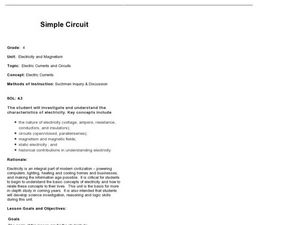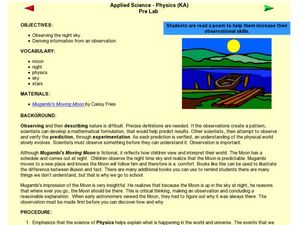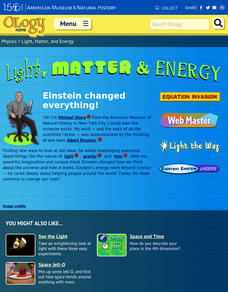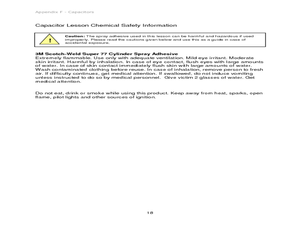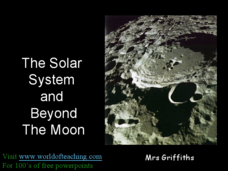Curated OER
Survival in Antarctica
Explore the harsh climate of Antarctica and its wildlife. Participate in experiments to determine how humans survive in the continent's climate, and address the difficulties faced by scientists.
Discovery Education
Cushion It!
Sugar cubes, collide! Groups design protection systems using bubble wrap to protect sugar cubes from being destroyed by falling batteries in the STEM lesson. They consider how the experiment relates to collisions in real-world...
University of Georgia
Splat!
What does viscosity have to do with splatter? An activity shows that the viscosity of a substance is inversely proportional to the distance of its splatter. Learners conduct the experiment by collecting data, graphing, and analyzing...
Curated OER
Describe the Perfect Pathogen
High schoolers develop a pathogen based upon their knowledge of pathogens and after presenting it to the class, they then suggest ways that the pathogen might be combated. Next they identify possible physical or behavioral changes in a...
Curated OER
Vibrant Volcanoes
Students explore volcanoes. In this science instructional activity, students discuss the characteristics of volcanoes and view a video segment about a volcano. Students examine plate tectonics.
Curated OER
The Trial of the Bloody Sucker
A blood sucking what? Grade schoolers identify the characteristics of blood sucking parasites. They organize their information, identify their arguments, and present them to the class in persuasive arguments. They participate in a debate...
Curated OER
Simple Circuit: Electric Currents and Circuits
Through inquiry and exploration, 4th graders will learn and understand the functions of open and closed circuits. They will break into 2 groups, define vocabulary, hypothesize how to light a bulb, then test their hypothesis 4 different...
Curated OER
Poetry and Observations
Young scholars compare poetry and the night sky. In this poetry instructional activity, students read poetry and compare the imagery from the poem with the night sky. Young scholars explore how science and poetry relate to one another.
Curated OER
Magnetism
Students explore physical science by participating in a class science activity. In this magnet attribute lesson, students define a list of scientific vocabulary terms associated with magnets and participate in hands on magnet activities....
Curated OER
Minerals And Their Uses
In this minerals instructional activity, students will review the four physical characteristics used to identify a mineral: streak, color, size, and hardness. Students will also understand the Mohs Hardness Scale. This instructional...
Curated OER
Matter
In this matter worksheet, students are given 10 sentences with italicized terms that are wrong. Students correct the terms to appropriately fit the sentences. Topics are related to matter such as physical and chemical properties, solids,...
Curated OER
Marine Animal and Plant Adaptations
Students examine nature by creating their own animals. In this animal adaptation activity, students define scientific vocabulary terms dealing with adaptation such as sea stars, sea cucumbers and exoskeleton. Students utilize their...
Curated OER
Water Pollution
Young scholars explore the causes of water pollution. For this environmental lesson, students conduct experiments with natural filtration systems.
American Museum of Natural History
Light, Matter and Energy
Let Einstein's work shine the way. Pupils read about Einstein's iconic equation, E=mc^2, using a remote learning resource and see how ideas from other scientists such as Kepner, Curie, Galilei, and Newton led to its discovery. They...
Curated OER
Water and Ice
Students explore water. In this water instructional activity, students explore the physical properties and states of water. They observe how water changes states and document what they see.
Curated OER
Capacitors: What Are They?
Students discover how capacitors help store data. In this computer science lesson plan, students investigate how capacitors can store an electronic charge, eventually helping computers store data. Students create their own...
Curated OER
Nuclear Reactions
Starting with a recap of atomic structure, these slides continue by comparing different isotopes of uranium and explaining which are stable and which have a decay period and emit alpha or beta particles. Gamma decay is just mentioned on...
University of Georgia
Stoichiometry of S'mores
How fun would it be to teach the concept of stoichiometry while allowing your chemistry class to assemble a classic campfire treat? This fun and engaging activity allows pupils to explore the principles of the chemical theory while...
University of Georgia
Antacid and Uncle Heartburn
Household materials can be used for more than cleaning! In this collaborative experiment, emerging chemists use products such as vinegar and liquid antacid to explore chemical reactions that commonly occur in the human body.
Urbana School District
Light
You matter, unless you multiply yourself by the speed of light ... then you energy. Presentation covers the behavior of light as both a wave and a particle, light versus sound, space travel, why objects have colors, depth perception,...
Curated OER
Liquids and Solids: Materials
Investigate the properties of solid and liquid materials. This very complete slide show is perfect for introducing liquids and solids to children in grades one or two. It describes multiple properties of solids, metals, plastics, wood,...
Virginia Department of Education
Mineral Identification
What's the difference between a rock and a mineral? And what properties are used to identify minerals? The first installment of a five-part series on earth materials and processes prompts young scientists to identify a set of...
Curated OER
The Solar System and Beyond: The Moon
Here is a very basic look at the moon and its positioning around our planet. The pictures and labels here show different phases and will help your space explorers understand our changing views of the moon along with the Earth's tilt and...
Curated OER
Waves: Sound and Light
A few definitions related to waves open this slide show. Note that the information only covers light waves even though the title mentions sound. Correct the title before using this resource. Another mention is a set of photos of a class...








